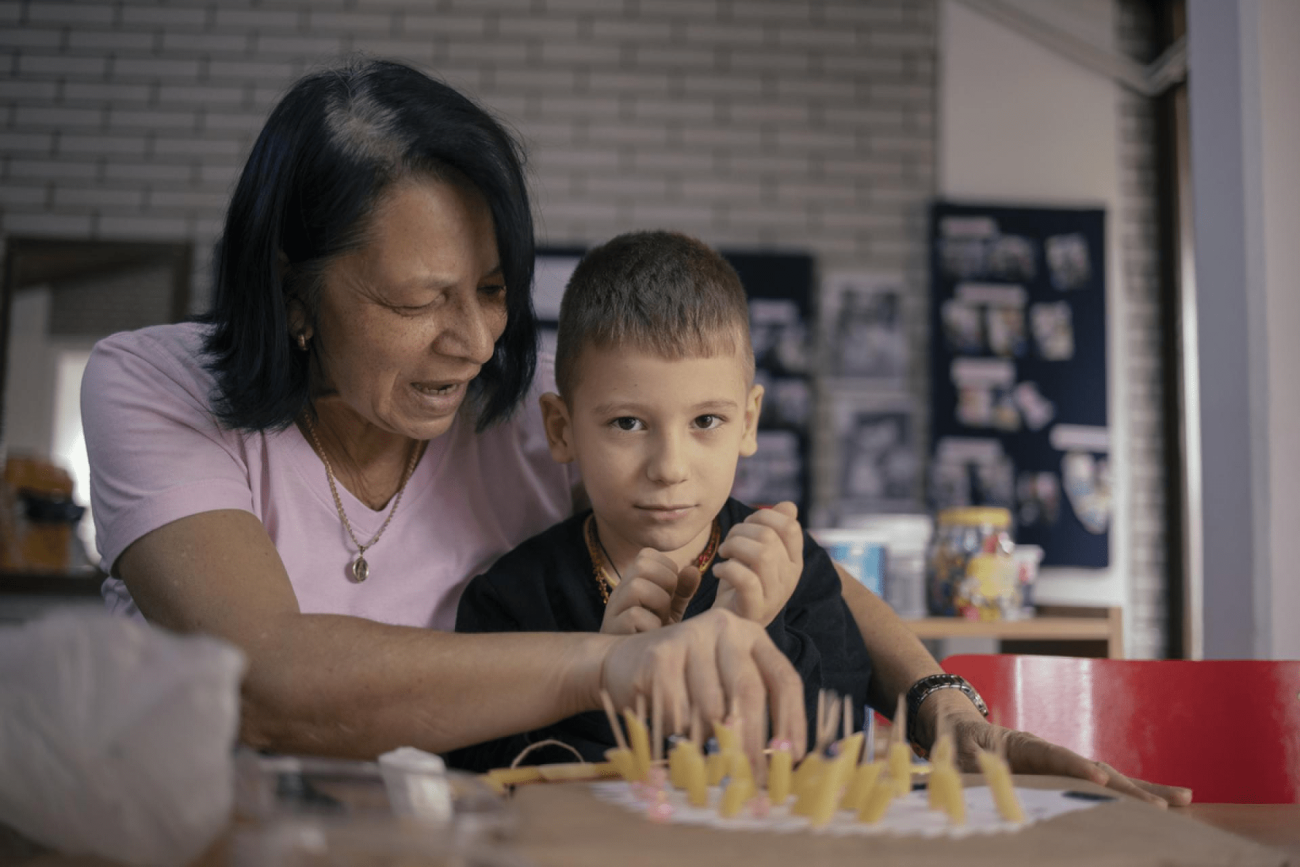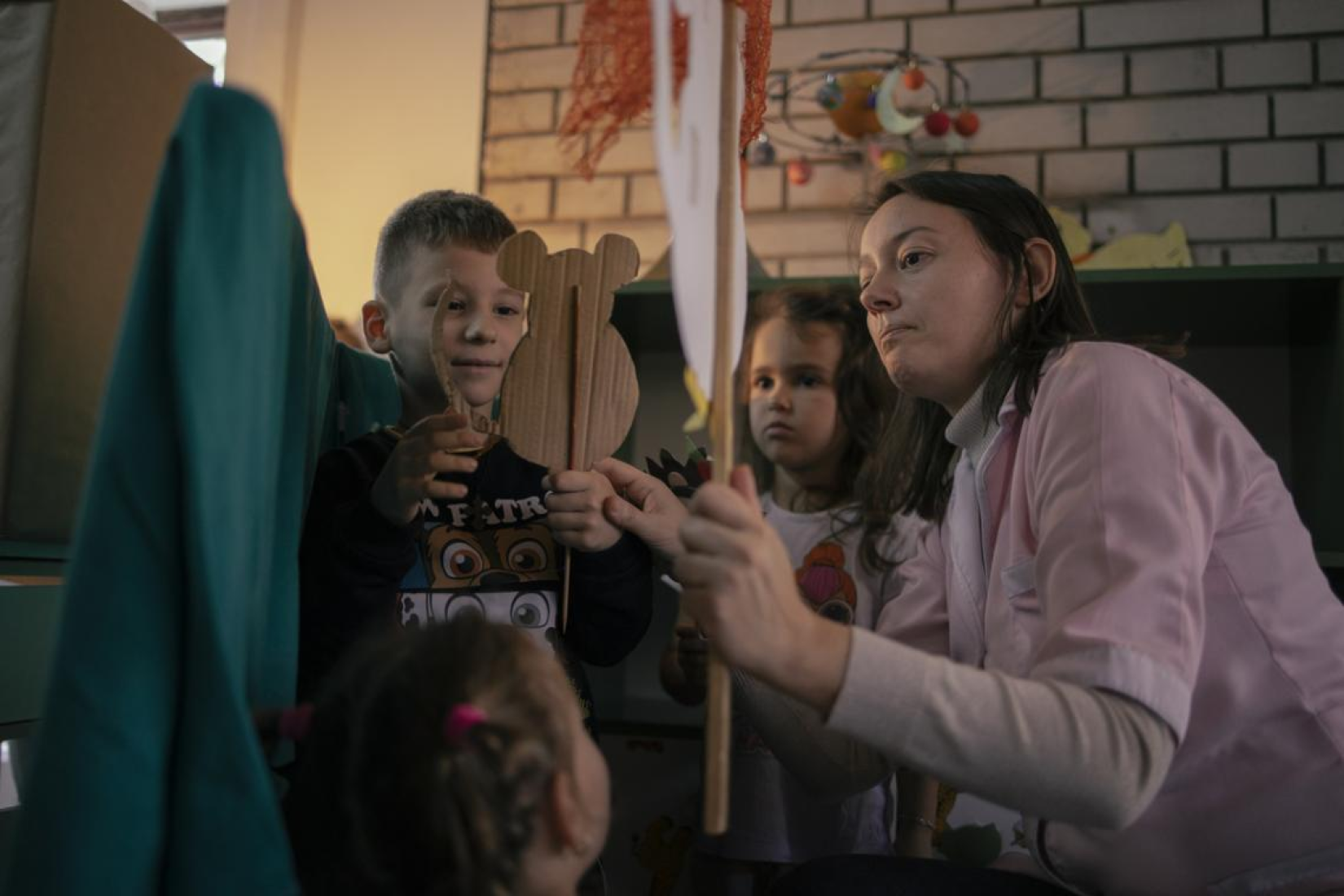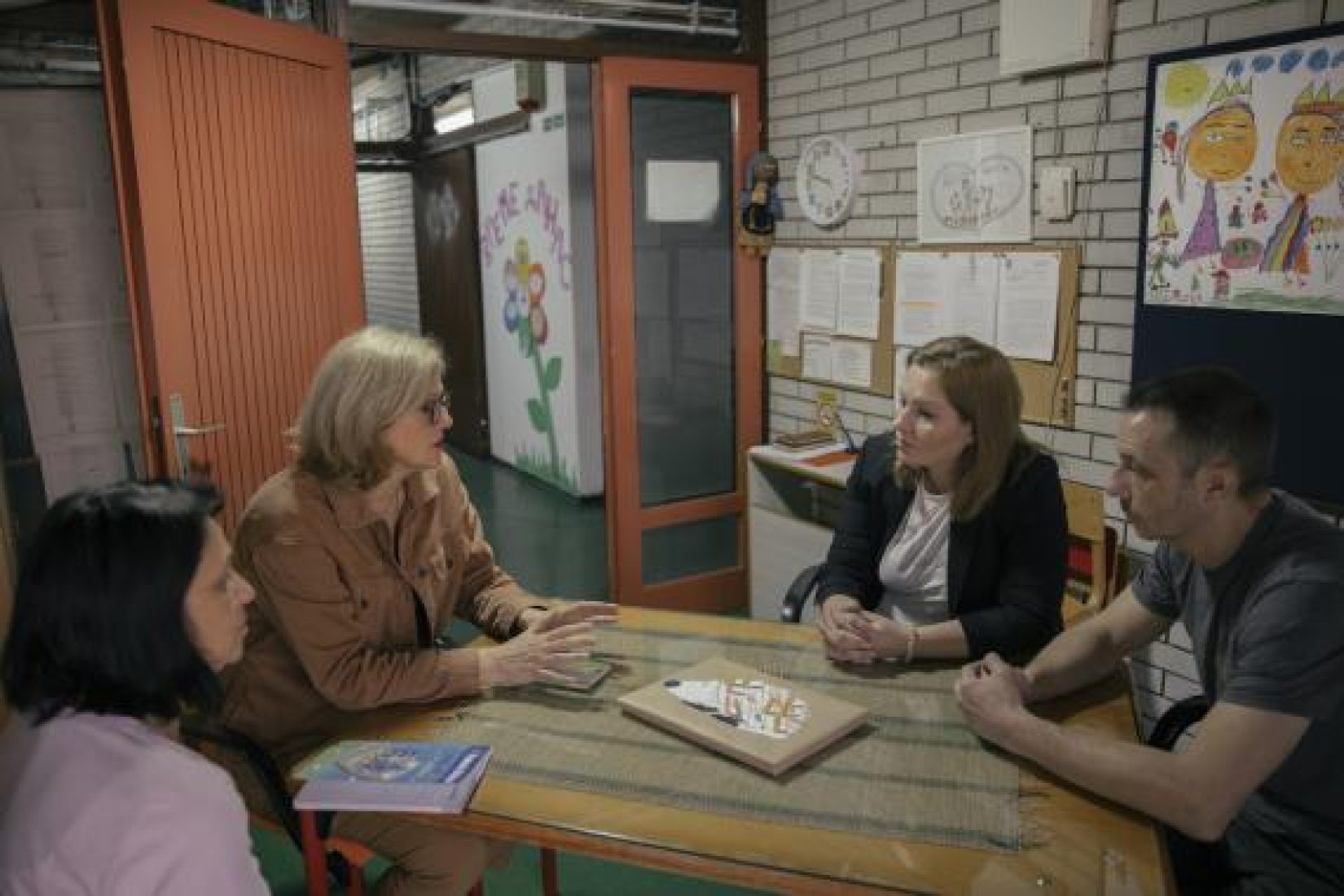Matej is a winner!

The little fighter was born prematurely and fought valiantly from his first day.
Leskovac, November 2022 – Matej is a fighter! This is the first thing anyone who knows this quiet five-year-old boy from Leskovac will say about him. What Matej likes the most in his preschool Kolibri are puppet shows. When he takes his favourite stick puppet, Matej becomes a wolf. The story goes on, and Matej and his friends and preschool teachers sing the story about the wolf.
“Matej is a fighter because he was born three months early, he went through a lot after he was born,” Matej’s mom Jelena Cvetkovic recalls. “He had a level two brain haemorrhage, a lot of problems with his lungs. That was his biggest problem, because he spent a lot of time on the ventilator, two whole months. He had several cases of pneumonia, one with sepsis, great prematurity, because it was a twin pregnancy and the labour started suddenly.”
Matej’s twin sister lived only nineteen days in the Belgrade Institute of Neonatology. It’s an understatement to say that it was a difficult period for the entire family.
“It’s very hard to talk about it. It was very stressful. There is no way to properly describe how difficult and stressful it was for us as parents,” explains the mom Jelena.
It was a time of great fear and uncertainty, filled with interventions, examinations and check-ups by neurologists, physiatrists and numerous specialists who monitored Matej’s development. “An extremely difficult period of life, a lot of panic, confusion,” says Dusan, Matej’s Dad.
Before his second birthday, Matej’s neurologist advised his parents that it was time to visit a speech therapist and a psychologist with their son, where they were told that it was important for the boy’s development to start going to preschool. And in preschool, the family could also count on support through the Family-Centred Early Interventions programme.
Mom Jelena vividly recalls Matej’s beginnings in his nursery class: On his first day in preschool, Matej was confused. He was carrying his toy elephant. But after two days he knew which were his shoes, his things. He wasn’t saying many words, but he knew when something was his. He was walking then, but his speech wasn’t great. We soon noticed that he became aware of his surroundings, friends. His speech improved.”

Even before starting preschool, they met psychologist Bojana Mihajlovic, a member of the early interventions team in Leskovac. The team consists of representatives from the developmental counselling unit, the primary health care centre, the preschool institution, and the centre for social work. What is even more important, the psychologist says, was getting to know each other within a family setting, during a home visit. Biljana is convinced that it was the most important experience, crucial for her future cooperation with these dedicated parents.
“That’s when I truly got to know this family, because I saw the environment, met other family members who they talk about a lot because they’re a dynamic family. Seeing the environment in which Matej is growing up, I saw the challenges they are facing, how to respond to all the challenges of modern life, and also respond to all the needs of the older child, Matej’s sister. Matej’s needs were extremely great and this is where the extended family, this social network, was of extreme importance.”
Biljana is a source of support for Matej’s parents, particularly at the time when their son had just adapted to kindergarten.
“She was a psychological support for us as parents. We needed that because the work with Matej is continuous. We do a lot of talking, repeating things, until he adopts it. She showed us how to explain things to him, how to tell him to do something in one, two or three words and in what order, to know in which order to follow what we told him to do,” explains Jelena.
“Biljana’s visits meant a lot to us. She taught us about many things, explained how to work with Matej, what impact the preschool teacher and other children in his class will have on him,” says Dusan
Matej’s preschool teacher, Sladjana, recalls Matej’s transition from the nursery to the older group. She remembers both Matej’s challenges and victories.
“At that time, we were working on building routines. Matej couldn’t wash his hands on his own or put on and take off his clothes. He needed our help. Children also helped him a lot. For example, when we were getting ready for the afternoon nap, one of his classmates would come to him and say: Come on Mata, raise your arms so we can take off one sleeve, then the other. They were helping him with everything. He accepted that, but now he’s completely independent. He can put on or take off his clothes on his own and he’s using eating utensils. His speech has developed, and before we barely understood him. We’re working to make his speech as loud and clear as possible. When we work on a story, everyone participates and repeats things. That’s how we work on speech. We also encourage Matej to participate in school plays. He likes using stick puppets.”

Matej has a mild form of cerebral palsy. He recently had another surgery, which helped him walk more easily and use both his arms equally. Another victory for Matej, another challenge for his parents who were able to overcome it with greater ease thanks to the help of preschool teachers, psychologists and Matej’s friends.
“Matej has been doing things the hard way ever since he was born, and that’s why he’s a fighter!”
Matej shares all his victories at home with his older sister.
“They play a lot at home, outside. She shows him how to draw, teaches him about colours, and letters as well,” dad Dusan says proudly.
In preschool, the support of the early interventions team continues. Matej’s mom and dad come to discuss their son’s progress with the preschool teachers and psychologist Biljana.
“It’s very important for us to sit down together. We can also discuss it in a group setting, but the best way is for us to sit down together in a quiet place at an agreed time. Then they talk about how Matej is doing at home, we talk about how he is doing in school, and we compare note. That’s how it’s done!” believes Biljana.
Family-centred early interventions focus on the entire family so that the child can achieve their full potential. Biljana is convinced that Matej is making progress precisely thanks to the support that he and his entire family are receiving through early interventions in preschool and at home and thanks to his dedicated parents.
“I think this is crucial - their dedication and determination to achieve something. In preschool, he received huge support from preschool teachers, who had enough understanding and willingness to create an environment in which Matej was fully accepted in his group. His friends did a lot for him. With the degree of stimulation that he received and the spotlight that we turn a little more on him, he can feel that this positive attention is directed towards him. Every child responds to this kind of attention, which is systemic, timely and coordinated. Together with the family, we’re working towards the goal which we have set together, and which is the family’s goal,” concludes Biljana.
The Ministry of Health, together with other ministries and with UNICEF’s support, as well as with the Open Society Foundation, the European Association for Early Intervention, and relying on professional knowledge and experience from Portugal, America, Australia, supports the development of a network of Family-Oriented Early Intervention Services (PORI) throughout Serbia. The coordinator of the Early Intervention Team is the development counselling centre of the district health centre, and the team includes all relevant experts of the health and social care system and preschool education. So far, 15 district in Serbia and 4 Belgrade teams for family-oriented early interventions have been included in the programme.
Support for the development of family-oriented early intervention services in the Republic of Serbia was provided through UNICEF’s regional project “Mitigating the impact of COVID-19 on children and families in the Western Balkans and Turkey”, which was funded by the European Union, through the European Commission’s Directorate-General for Neighbourhood Policy and Enlargement Negotiations (DG NEAR). This project supported the expansion of the PORI service network from 5 pilot sites to 13 new locations, through the education of professionals and digital equipment for health centres, preschools and centres for social work which are part of the Family-Oriented Early Intervention Services network.
Written by Jelena Terzic




